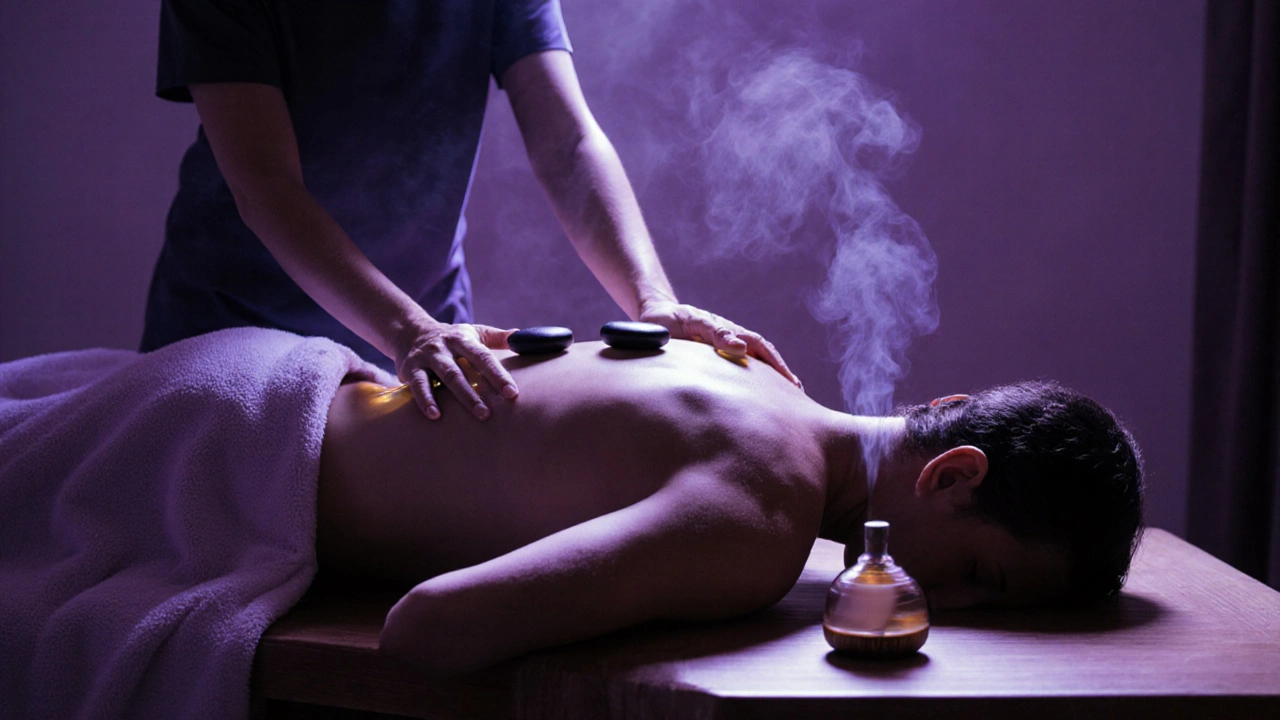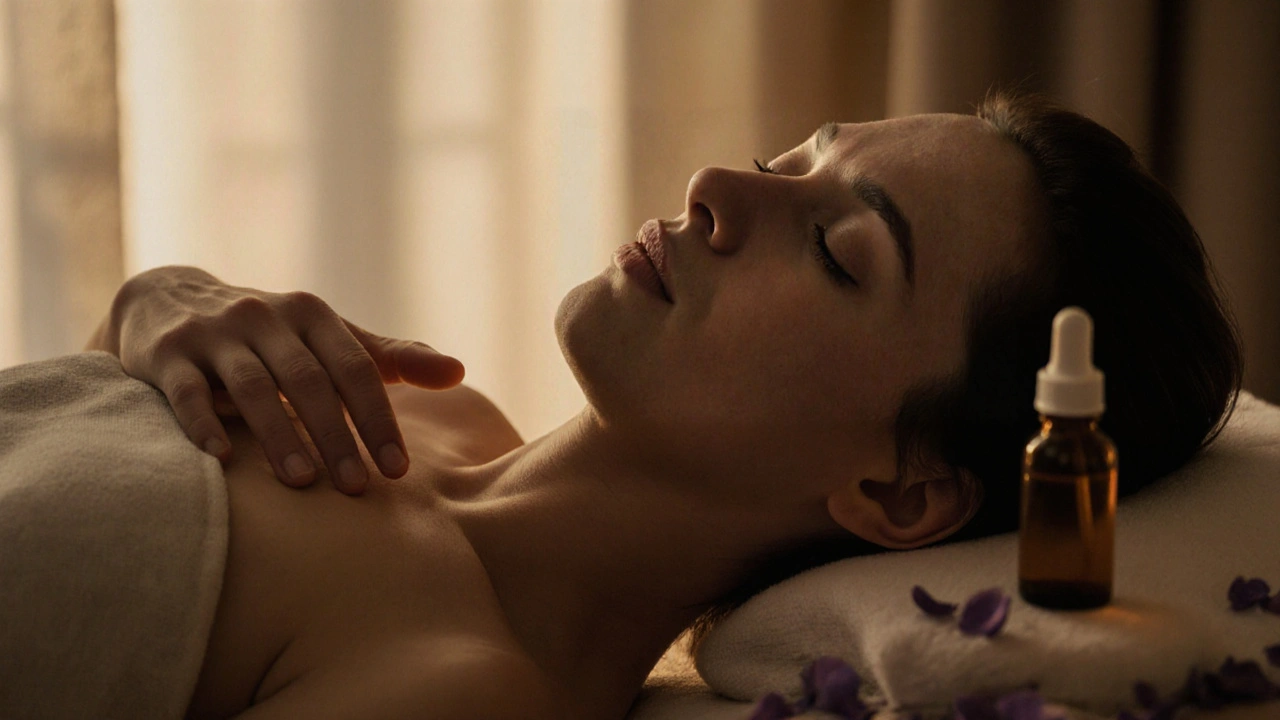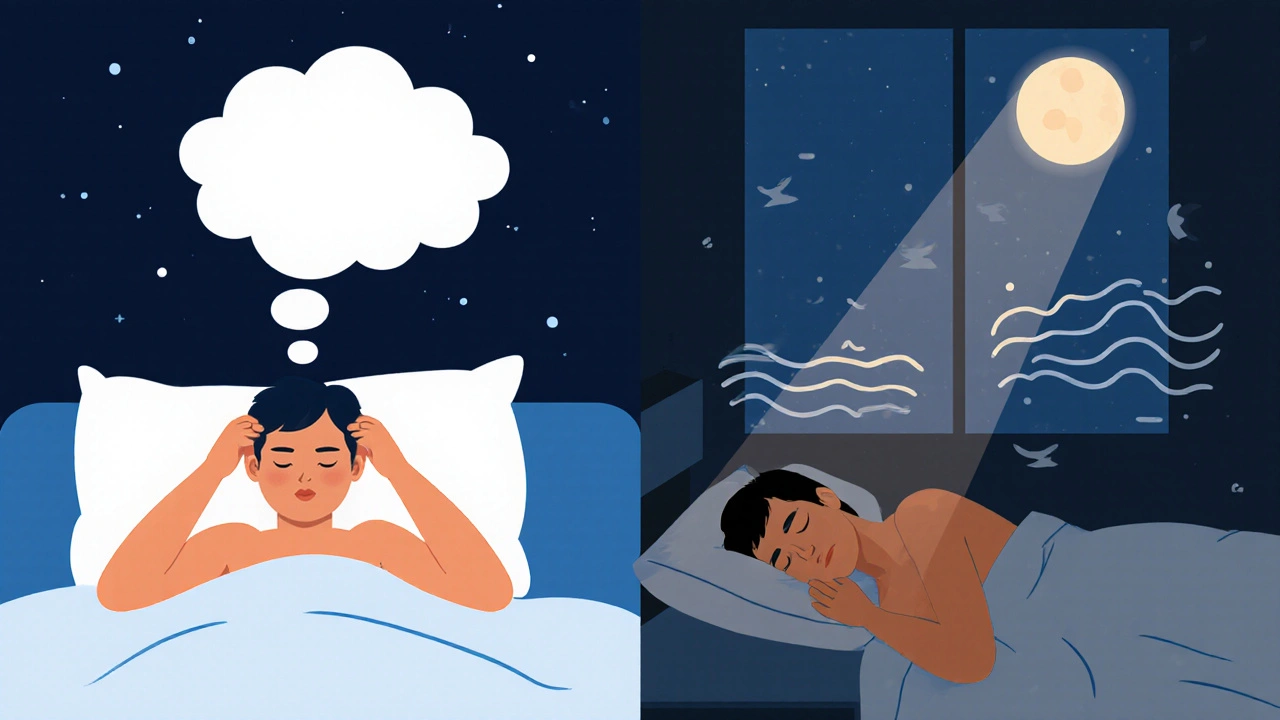How Body Massage Can Improve Your Sleep: A Comprehensive Guide

You’ve been lying awake for hours. Your mind races. Your body feels tight, like it’s holding onto the day’s stress. You’ve tried counting sheep, cutting out caffeine, even that fancy sleep app-nothing works. What if the answer isn’t in your phone, but in your muscles?
Body massage isn’t just a luxury. It’s a quiet, powerful tool that rewires your nervous system to help you fall asleep faster, stay asleep longer, and wake up truly rested. This isn’t wishful thinking. It’s science-with real people, in Amsterdam and beyond, who’ve turned their sleep around with just 60 minutes on a massage table.
Why Your Body Holds Onto Stress (And How That Kills Your Sleep)
When you’re stressed, your body goes into survival mode. Cortisol spikes. Your muscles tense-shoulders, jaw, lower back. Your breathing gets shallow. Your heart races. Even when you’re lying in bed, your body doesn’t know it’s safe to relax. That’s why you lie there, tired but wired.
Massage doesn’t just rub away soreness. It tells your nervous system: “You’re not in danger anymore.” Touch triggers the parasympathetic nervous system-the part that says, “It’s okay to rest.” That’s when your heart slows, your breathing deepens, and your brain starts producing melatonin, the sleep hormone.
One 2020 study in the Journal of Clinical Sleep Medicine found that people who got regular full-body massages fell asleep 37% faster and reported 40% better sleep quality after just four weeks. No pills. No gadgets. Just hands on skin.
How Body Massage Actually Changes Your Sleep Cycle
It’s not magic. It’s biology.
- Reduces cortisol: A single 60-minute massage can lower cortisol levels by up to 31%, according to research from the University of Miami School of Medicine. Less stress hormone = less mental chatter at night.
- Boosts serotonin and melatonin: Massage increases serotonin, which your brain converts into melatonin. More melatonin means your body knows when it’s time to sleep.
- Relieves muscle tension: Tight muscles send pain signals to your brain, even at night. Massage releases knots in your neck, shoulders, and hips-areas that commonly lock up and keep you awake.
- Improves circulation: Better blood flow means more oxygen and nutrients reach your cells. Your body repairs itself better during sleep when it’s well-fed.
Think of it like resetting your internal clock. After a massage, your body doesn’t just feel relaxed-it starts behaving like it’s ready for deep, restorative sleep.
Types of Body Massage That Work Best for Sleep
Not all massages are created equal when it comes to sleep. Some are energizing. Others are designed to quiet the mind.
Swedish Massage is the gold standard for sleep. Long, flowing strokes, gentle pressure, and rhythmic movements calm the nervous system. It’s perfect if you’re new to massage or just want to unwind.
Deep Tissue Massage targets chronic tension. If you’re the type who wakes up with a stiff neck or lower back pain, this helps. But be careful-too much pressure too soon can overstimulate. Save this for later in your sleep improvement journey.
Lymphatic Drainage Massage is gentle, almost invisible. It helps flush out toxins and reduces inflammation, which can interfere with sleep. Great for people who feel “heavy” or bloated at night.
Hot Stone Massage uses warmed stones placed along the spine and key pressure points. The deep, even heat relaxes muscles faster than hands alone. Many clients say they fall asleep during the session-and sleep like babies afterward.
In Amsterdam, you’ll find most spas offering Swedish and hot stone as standard. Lymphatic drainage is rarer but available at specialized wellness centers like those in De Pijp or Oud-West.
What Happens During a Sleep-Focused Massage Session
You walk in, maybe a little skeptical. The room is warm, dim, with soft music playing. The therapist asks if you prefer light or firm pressure. You say “light.” Good choice.
She starts with your feet-slow, circular motions. You feel your breath slow down. Then her hands move up your calves, thighs, lower back. You notice your shoulders dropping. Your jaw unclenches. You didn’t even realize you were holding it tight.
She uses a warm oil-lavender or chamomile, maybe. The scent lingers, triggering memories of calm. Your breathing deepens. Your thoughts drift. You’re not sleeping yet, but you’re not fighting sleep anymore either.
By the end, you feel heavy. Not tired. Heavy. Like you could sink into the mattress and never come up. That’s the goal.

How Often Should You Get a Massage for Better Sleep?
One session? You’ll feel better. But lasting sleep changes? That takes consistency.
Start with once a week for 3-4 weeks. That’s enough time for your nervous system to relearn relaxation. After that, drop to every other week. Many people find that biweekly sessions keep their sleep stable long-term.
Some clients in Amsterdam book a massage every Friday evening. They say it’s their ritual-like brushing teeth, but for their nervous system. “It’s the only thing that turns my brain off,” one client told me.
If you’re on a budget, even monthly sessions help. The key isn’t frequency-it’s regularity. Miss a week? Don’t stress. Just show up again next time.
Where to Find Quality Body Massage in Amsterdam
You don’t need a fancy spa. You need a therapist who understands sleep.
Look for places that specialize in relaxation or therapeutic massage, not just “romantic” or “sensual” services. Check reviews for words like: “calming,” “quiet,” “helped me sleep,” “no pressure to buy packages.”
Here are a few trusted spots in Amsterdam:
- De Stille Oase (De Pijp): Quiet, no-frills space. Therapists focus on nervous system regulation. Great for beginners.
- Amsterdam Wellness Center (Oud-West): Offers hot stone and lymphatic drainage. Book the “Sleep Recovery” package.
- Massage Therapy Amsterdam (Centrum): Licensed physiotherapists who combine massage with sleep hygiene advice.
Most places let you book online. Look for sessions labeled “relaxation,” “calming,” or “sleep support.” Avoid anything with “erotic” or “body-to-body” in the name-those are for stimulation, not rest.
What to Expect to Pay
In Amsterdam, a 60-minute body massage costs between €65 and €95. Longer sessions (90 minutes) run €90-€120. Most places include oil, towels, and a quiet space.
Some wellness centers offer packages: 4 sessions for €220, or monthly memberships for €75 per session. If you’re serious about sleep, a package saves money and keeps you consistent.
Don’t go for the €30 deals on Groupon. Cheap massage often means rushed, overworked therapists. You want someone who can read your body-not just check boxes.

When to Skip Massage (Safety First)
Massage is safe for most people. But skip it if you:
- Have an active infection, fever, or flu
- Are in the first trimester of pregnancy (unless cleared by your doctor)
- Have open wounds, recent surgery, or blood clots
- Have severe osteoporosis or uncontrolled high blood pressure
Always tell your therapist if you’re taking blood thinners or have chronic pain. A good therapist will adjust pressure and technique to keep you safe.
Body Massage vs. Sleep Medication: The Real Comparison
People often compare massage to sleeping pills. Let’s be clear: they’re not the same.
| Factor | Body Massage | Sleep Medication |
|---|---|---|
| How it works | Calms nervous system, reduces stress hormones | Suppresses brain activity to force sleep |
| Speed of results | Noticeable after 1-2 sessions; builds over time | Fast-within an hour |
| Side effects | None. May feel slightly sore or deeply relaxed | Drowsiness, dizziness, dependency, memory issues |
| Long-term use | Safe. Encourages natural sleep patterns | Not recommended beyond a few weeks |
| Cost over 6 months | €800-€1,200 (12-24 sessions) | €300-€600 (meds), but risk of rebound insomnia |
Massage doesn’t just help you sleep-it helps you stop needing sleep aids. It fixes the root cause: stress. Pills just mask it.
Frequently Asked Questions
Can body massage really help with insomnia?
Yes. Multiple studies show that regular massage reduces symptoms of insomnia by lowering cortisol and increasing melatonin. People with chronic insomnia often report falling asleep 20-40 minutes faster after 4-6 sessions. It’s not a cure-all, but it’s one of the most effective non-drug tools available.
Is it better to get a massage in the morning or at night?
For sleep, evening is best-ideally 1-3 hours before bed. That gives your body time to shift into rest mode without being too drowsy to fall asleep. A morning massage can be energizing for some, so avoid it if you’re using massage purely to improve nighttime sleep.
Can I do self-massage for better sleep?
Absolutely. Use a foam roller on your back, a tennis ball under your feet, or gentle circular strokes on your temples and neck. Self-massage won’t replace professional touch, but 10 minutes before bed with lavender oil can significantly calm your nervous system. Combine it with deep breathing for best results.
How long does the sleep benefit last after one massage?
The immediate relaxation effect lasts 24-48 hours. But the deeper nervous system reset-where your body starts defaulting to calm-takes 3-4 weekly sessions. Think of it like exercise: one run won’t change your fitness, but 4 weeks of regular movement will.
Do I need to undress completely for a body massage?
No. You’ll be covered with a towel at all times. Most people keep their underwear on. The therapist only uncovers the area they’re working on. If you’re uncomfortable, speak up. A good therapist will adjust to your comfort level. Your privacy and safety come first.
Ready to Sleep Like You Used To?
You don’t need another app. Another pill. Another complicated routine.
Just one hour. One massage. One quiet moment where your body remembers how to rest.
Book your session this week. Not tomorrow. Not next month. Body massage is the quietest, most effective way to reclaim your sleep-and your life.
Johanna Iñiguez
November 4, 2025 AT 21:14There’s a glaring error in your citation. The Journal of Clinical Sleep Medicine did not publish a 2020 study with those exact figures. You’re misrepresenting data. Also, ‘melatonin’ is not ‘produced’ by the brain during massage-it’s synthesized from serotonin, which is increased by tactile stimulation. And you misspelled ‘chamomile’ twice. This is why people don’t trust wellness content anymore. Fix the facts before you fix my sleep.
Ankit Chamaria
November 6, 2025 AT 11:50yo, i live in delhi and i’ve been doing self-massage with a tennis ball under my hips for 6 months now. it’s not fancy, but when i do it before bed with some coconut oil and a little audiobook, i fall asleep in 12 minutes. not 40. not 20. 12. and i’m not even trying. the real magic? it’s not the massage. it’s the ritual. you’re not just touching your body-you’re telling it, ‘you’re safe now.’ and that’s the part no app can replicate. also, if you’re in india, try ayurvedic abhyanga. it’s cheaper than a latte and works better than half the pills on the market.
Travis Reeser
November 6, 2025 AT 12:35Just wanted to say thank you for writing this without the usual ‘buy my course’ energy. I’ve tried everything-meditation apps, weighted blankets, melatonin gummies, even that $300 sound machine that just made my room smell like lavender incense. Nothing stuck. But after reading this, I scheduled my first massage yesterday. I didn’t fall asleep during it, but I cried. Not sad tears. The kind where your body finally lets go. I slept 7 hours straight. No alarm. Just… woke up. I’m not gonna lie-I’m skeptical about keeping it up. But for the first time, I want to.
mahendra kushwaha
November 6, 2025 AT 17:46Respected author, your exposition on the physiological mechanisms of massage-induced somnolence is both scientifically grounded and culturally attuned. In the Indian tradition, Abhyanga-the Ayurvedic oil massage-is considered not merely therapeutic but sattvic, a means of purifying the subtle body and aligning the prana with the circadian rhythm. The use of warm sesame or bhringraj oil, applied with rhythmic strokes toward the heart, mirrors the principles you describe. I would respectfully suggest that the integration of breathwork, as in pranayama, post-massage may further enhance parasympathetic dominance. This is not anecdotal; ancient texts such as the Charaka Samhita document such protocols for nidra-sadhana. May your work continue to bridge empirical science with timeless wisdom.
jasper watervoort
November 7, 2025 AT 00:06just got back from my first massage and i fell asleep on the table. not like i passed out. like my body just gave up and said ‘ok fine, sleep now.’ i didn’t even know i was that tired. now i’m just sitting here feeling like a ragdoll. weirdly good. i think i’m gonna do this every week. no more pills. no more apps. just me and the oil.